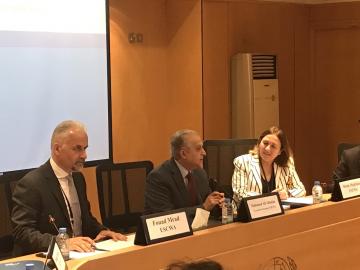The 5th ESCWA Technology Center’s Technical Committee Meeting
ESCWA Technology Centre (ETC) organized its 5th Technical Committee Meeting in Beirut during 23 - 24 May 2017. This meeting was held in accordance with the ETC Statute to give guidance to the Centre on its future work plan, and to identify member countries’ priorities and challenges in harnessing national capabilities in science, technology, and innovation in the implementation of the sustainable development goals. Meeting participants thus included 31 representatives from academia, research institutions, ministries, industry, NGOs and other UN Agencies. The participants were from14 ESCWA Member countries and deliberated on the role of ETC in serving its objectives.
The meeting derived Key messages for ETC to develop its 2018-2019 draft work program that will be further reviewed and discussed by ETC Board of Governors (BOG) and then approval in its next regular meeting.
Since its establishment in 2010, ESCWA Technology Centre has been assisting the member countries to harness science and technology for enhancing their socio-economic development, and establishing their national technology development and transfer systems. In 2016, in support of addressing the challenges of the Agenda 2030 for Sustainable Development which was launched in late 2015, ETC developed a responsive work plan targeted towards assisting the member countries in implementing the Sustainable Development Goals (SDGs).
Furthermore, in 2017 ETC is committed for the following expected accomplishments within the overall objectives to mainstream the Agenda 2030 for Sustainable Development into regional and national policy processes and programs:
- To map, analyze and improve the national technology development and transfer landscape system components and relevant legislations to obtain a more productive and legal framework that is more coherent in support of more inclusive economic development;
- To strengthen the scientific content of various critical economic sectors with selective contributions related to adequate technologies for food security, green development, sustainable energy and water resources enforcing the socio-economic resilience in Member countries;
- To facilitate regional cooperation in research, development and innovation addressing challenges in identified regional sustainable development priorities like Water, Energy, Food security and adaptation to and mitigation of Climate Change.






